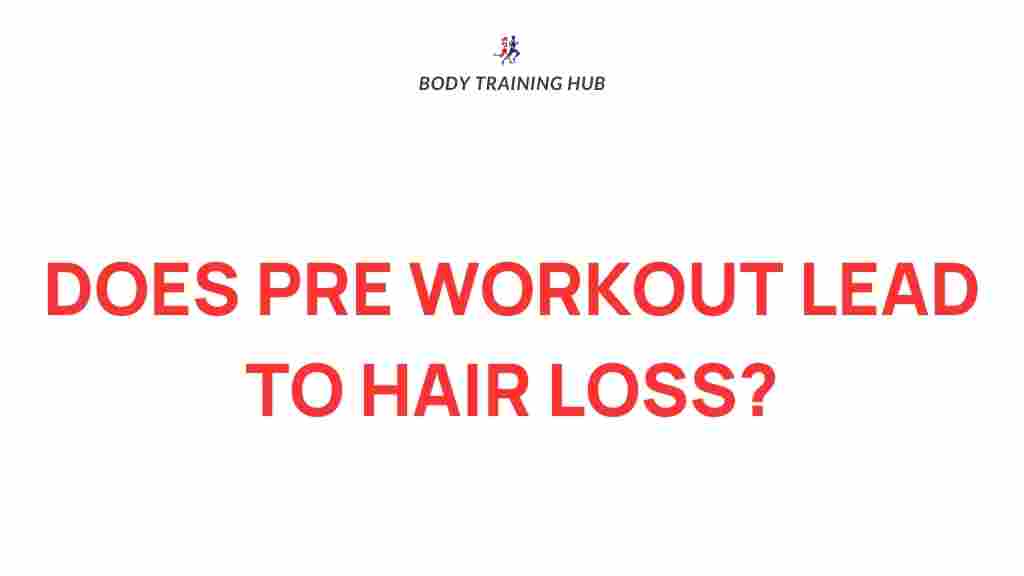Revealed: The Surprising Link Between Pre-Workout Supplements and Hair Loss
In the world of fitness, pre-workout supplements have become increasingly popular for their ability to enhance performance and energy levels. However, as more individuals turn to these products to maximize their workouts, a concerning question arises: could there be a connection between pre-workout supplements and hair loss? In this article, we will delve into the ingredients found in pre-workout supplements, explore the potential side effects, and examine the myth surrounding their link to hair loss.
Understanding Pre-Workout Supplements
Pre-workout supplements are designed to boost energy, endurance, and focus during workouts. They typically contain a variety of ingredients, including:
- Caffeine: A well-known stimulant that increases energy and alertness.
- Creatine: A compound that helps improve performance in high-intensity workouts.
- BCAAs (Branched-Chain Amino Acids): Essential nutrients that support muscle recovery.
- Nitric Oxide Precursors: Ingredients like L-arginine that promote blood flow.
- Vitamins and Minerals: Essential nutrients that can aid in overall health.
While these ingredients can be beneficial for fitness enthusiasts, it’s crucial to understand how they might affect other aspects of health, including hair health.
The Myth of Hair Loss and Pre-Workout Supplements
One prevalent myth is that pre-workout supplements directly cause hair loss. This assertion has led many to question whether their fitness regimen is worth the potential cost to their hair. But what does the science say?
Hair loss can occur due to a variety of factors, including genetics, hormonal changes, stress, and nutritional deficiencies. While certain ingredients in pre-workout supplements can influence hormone levels, the direct link to hair loss is not well-established. However, some individuals may experience hair thinning due to other underlying health issues exacerbated by intense workout regimes and supplementation.
Potential Side Effects of Pre-Workout Supplements
While pre-workout supplements can boost performance, they can also come with side effects that may indirectly affect hair health. Common side effects include:
- Increased Heart Rate: Caffeine and other stimulants can elevate heart rate, leading to increased stress on the body.
- Dehydration: Some ingredients may lead to dehydration, which can affect overall health, including hair health.
- Digestive Issues: Some users report gastrointestinal discomfort, which can affect nutrient absorption.
- Sleep Disturbances: High caffeine content may disrupt sleep, leading to increased stress and potential hair loss.
How Ingredients May Impact Hair Health
Let’s take a closer look at specific ingredients in pre-workout supplements and how they might relate to hair loss:
Caffeine
Caffeine, a common ingredient in pre-workouts, has been shown to have both positive and negative effects on hair health. On one hand, it can stimulate hair growth by increasing blood circulation to the scalp. On the other hand, excessive consumption can lead to dehydration and hormonal imbalances, which may contribute to hair loss.
Creatine
Creatine is generally considered safe for most people and has not been directly linked to hair loss. However, it can lead to weight gain and changes in body composition, which may indirectly affect self-esteem and stress levels, potentially impacting hair health over time.
Nitric Oxide Precursors
These ingredients improve blood flow, which is beneficial for muscle performance. However, if they lead to excessive vasodilation, it may affect blood pressure and overall health, leading to secondary issues that could impact hair health.
Step-by-Step Approach to Minimize Risks
If you are concerned about hair loss but still want to use pre-workout supplements, consider the following steps:
- Consult a Healthcare Professional: Before starting any supplement, it’s best to discuss with a doctor, especially if you have a history of hair loss or other health concerns.
- Research Ingredients: Look for supplements with transparent labeling and known safe ingredients. Avoid those with proprietary blends that do not disclose specific amounts.
- Monitor Your Body: Pay attention to how your body reacts after taking pre-workout supplements. If you notice increased hair shedding, consider reducing the dosage or discontinuing use.
- Stay Hydrated: Drink plenty of water before, during, and after your workout to counteract dehydration caused by stimulants.
- Maintain a Balanced Diet: Ensure you are getting enough vitamins and minerals that support hair health, such as Biotin, Vitamin D, and Iron.
Troubleshooting Hair Loss Concerns
If you are experiencing hair loss and suspect it may be linked to your fitness routine or pre-workout supplements, consider the following troubleshooting tips:
- Reduce Supplement Intake: Cut back on the amount of pre-workout you are taking or switch to a lower-stimulant alternative.
- Evaluate Your Workout Intensity: Intense workouts can lead to stress and potential hormonal changes. Consider adjusting your workout intensity.
- Track Dietary Changes: Keep a journal of your diet and supplement intake to identify any potential triggers for hair loss.
- Seek Professional Help: If hair loss persists, consult a dermatologist or trichologist to explore underlying causes.
Conclusion: Balancing Fitness and Health
While there is a growing concern about the link between pre-workout supplements and hair loss, it’s important to approach the topic with caution and an open mind. Though some ingredients may influence hair health indirectly, they are not the sole cause of hair loss. By understanding the potential side effects and monitoring your body’s response to these supplements, you can continue to pursue your fitness goals without sacrificing your hair health.
Ultimately, the key to a successful fitness journey is balance—ensuring that your workouts, nutrition, and overall health are aligned. For those interested in more insights about fitness and health, feel free to check out this comprehensive guide on fitness supplements.
Stay informed, listen to your body, and remember that the best approach to health is one that considers all aspects, including the impact of supplements on your well-being.
This article is in the category Myths & Facts and created by BodyTraining Team
